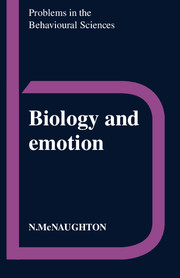Book contents
- Frontmatter
- Contents
- Preface
- Acknowledgements
- 1 Emotion since Darwin
- 2 Releasers and state-dependent reflexes
- 3 Purpose and emotion
- 4 Expression: a window on the emotions?
- 5 Are physiological changes epiphenomena of emotion?
- 6 Somatic influences on the emotions
- 7 Optimal foraging and the partial reinforcement effect: a model for the teleonomy of feelings?
- 8 Do emotions mature or differentiate?
- 9 Cognition, learning and emotion
- 10 Interaction of the components of emotion
- 11 Of mice and men
- 12 Biology and emotion: some conclusions
- Glossary
- Notes
- References
- Index
1 - Emotion since Darwin
Published online by Cambridge University Press: 05 August 2012
- Frontmatter
- Contents
- Preface
- Acknowledgements
- 1 Emotion since Darwin
- 2 Releasers and state-dependent reflexes
- 3 Purpose and emotion
- 4 Expression: a window on the emotions?
- 5 Are physiological changes epiphenomena of emotion?
- 6 Somatic influences on the emotions
- 7 Optimal foraging and the partial reinforcement effect: a model for the teleonomy of feelings?
- 8 Do emotions mature or differentiate?
- 9 Cognition, learning and emotion
- 10 Interaction of the components of emotion
- 11 Of mice and men
- 12 Biology and emotion: some conclusions
- Glossary
- Notes
- References
- Index
Summary
‘When I use a word,’ Humpty Dumpty said in a rather scornful tone, ‘It means just what I choose it to mean – neither more nor less.’
‘The question is,’ said Alice, ‘whether you can make words mean so many different things.’
‘The question is,’ said Humpty Dumpty, ‘which is to be Master–that's all.’
Lewis Carroll: Through the Looking GlassWhat is an emotion?
Emotion is a striking feature of human experience. In any one day we may experience fear, love, pity, rage and many more. Emotion colours our everyday thoughts and actions and generates most of the behaviour which makes our friends and neighbours interesting. Much of Art and Literature is devoted to exploring its subtleties and, at a more practical level, emotions sway events in politics and commerce to a frightening extent. Psychology, the science of the mind, might therefore be expected to give pride of place to emotion as a topic of concern.
Unfortunately, there has never been any clear agreement as to what the word means. Amongst philosophers, ‘emotion has almost always played an inferior role … often as an antagonist to logic and reason … Along with this general demeaning of emotion in philosophy comes either a wholesale neglect or at least retail distortion in the analysis of emotions’ (Solomon, 1977, cited by Lyons, 1980, p ix). Psychologists have followed this lead.
- Type
- Chapter
- Information
- Biology and Emotion , pp. 1 - 16Publisher: Cambridge University PressPrint publication year: 1989

